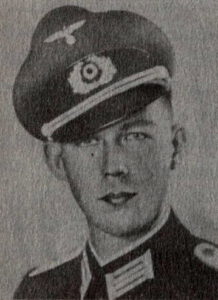Mail Correspondence with Soldiers at War (“Feldpostbriefe”): Letter of German soldier Hans-Joachim Breitenbach from Russia, 3 January 1942 (Published on 06/06/2022)
Feldpostbriefe and their significance today
When researching Julius Erasmus, one inevitably comes into contact with letter correspondence between soldiers at war and their families from the time of the Second World War, such correspondence being called “Feldpostbriefe” in German. Be it messages about the death of a soldier, written by his superior to his relatives, which were later sent to Mr Erasmus as a hint for a grave search, or other correspondence between soldiers at war and their families at home. Since then, I have also been dealing more closely with field post letters from that time.
Feldpostbriefe are valuable contemporary documents that unfold their timeless message, especially in times like the present, and convey a vivid impression of what war means to all involved. They are a valuable tool to ward off the very beginnings of a renewed striving for war and perhaps to help prevent history from repeating itself once again and with yet more gruesome consequences for mankind. At present, war, weapons and the killing of people on a large scale are once again being drummed up forcefully, although for decades one could have had the vague hope that mankind had finally learned its lesson to some extent from the painful experiences of two world wars in particular. Unfortunately, this does not seem to be the case once again.
With this in mind, appropriate letters or letter excerpts from various sources will be published here from time to time in the section “Mail Correspondence with Soldiers at War (Feldpostbriefe)” as a reminder of what war means to man and mankind. To provide food for thought and in the unshakable hope that this may make a difference.
Feldpostbrief from Wehrmacht Lieutenant Hans-Joachim Breitenbach dated 3 January 1942, presumably to a school friend
(source: Volksbund Deutsche Kriegsgräberfürsorge, Letzte Lebenszeichen – Briefe aus dem Krieg, p. 39 f. (translation form German)):
“We have experienced days that had not existed before – even in the World War. The Wehrmacht report only said that Tikhvin had to be evacuated from us. But what this retreat meant for us, nobody can imagine. Some Inf.-Kp. [Infantry Companies] were only 7 men strong. Due to a single aerial bomb, our company had further 11 dead and 10 wounded on 18 December.
(…)
You will certainly be surprised that I am writing such a long letter. I would have so much to report that I could write whole books with it, but everything I have experienced cannot be written. […] Because this is not life here in Russia, it is a fight for life. […] In general, we have become quite different out here; and many will not understand us. They will be surprised that we will not tell about the war, but only find harsh, bitter words for it; they will resent us that we read at most only the novel or the entertainment section in the newspaper; they will look at us askance when we turn off the radio news; they will scold us that we want to be left alone from everything and can often get quite rude; they will not understand that we can no longer watch a newsreel. But we know why!
When the Liegnitzer Tageblatt [a newspaper in the city of Liegnitz] says that Tikhvin was far behind the German front, while we had to defend the last remnants and ruins of the division of this Tikhwin to the last man, until – yes, until there were simply no soldiers left, then perhaps some will guess what was going on inside us. Here was no PK-reporter [reporter of the propaganda company], and no PK-report tells about the last men in Tikhvin. The writer of this article should have been in Tikhvin for only one day; I would have even walked with him in the city; but he would never have written anything more about war or soldiering. He probably never saw those soldiers retreating in small groups, limping and freezing, with sacks wrapped around their feet, walking back leaning on sticks, leaving all unnecessary stuff behind; undefeated by the Russian, but conquered by the cold. That was Tikhvin!
And in the spring we will again go on the attack across the Volchov and take from the Russian the land where so many of our comrades lie and which has seen so much blood, death and horror. I hope that we will be there again then. For the time being, however, we want to rest a little, and we would prefer a vacation, but so few people are allowed to go that it might not be my turn until January 1946. […] We were on duty until 19 December and noticed nothing of Christmas at all, even wishing to be on the march on Christmas Eve so as not to notice anything of Christmas. But when we came to rest on the 20th and all possible Christmas preparations were made, we all got into the right festive mood and experienced one of the most beautiful and moving Christmases ever. I will tell you more about it in my next letter. […] and the burning candles made us forget Russia and awakened in us the memory of our childhood and the longing for home; for a little love. […]”
Hans-Joachim Breitenbach, born on 5 November 1919 in Berlin-Wilmersdorf, was killed as a Lieutenant in Panzerjägerabteilung 18 (“Tank Destroyer Section 18”) on 13 January 1942 near Staraja Russa/Russia.
(Head picture: Ehrenfriedhof Heidelberg, April 2022)
If you wish to support my work, you can do so here. Many thanks!


